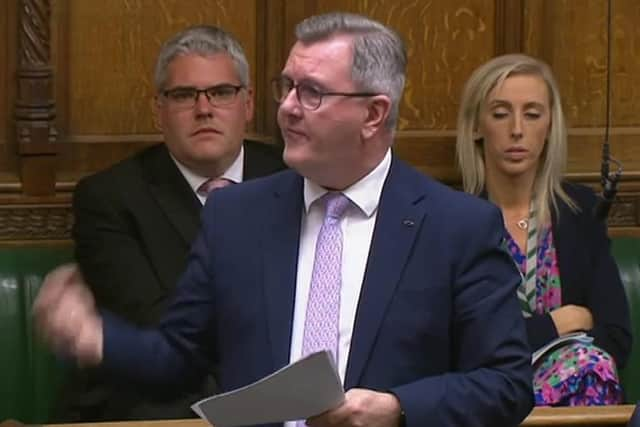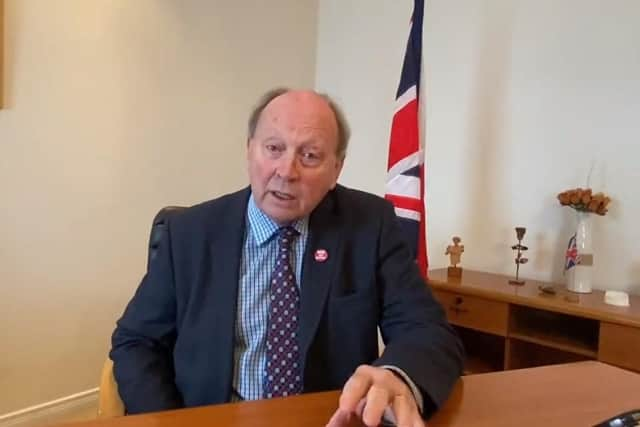Donaldson declares current Brexit bill can ‘decapitate’ the Northern Ireland Protocol as Allister warns about danger of ‘another Tory double-cross’
and live on Freeview channel 276
However, on the question of whether a future government may simply reinstate it, he said “there is always a risk” of London imposing whatever policy it wants upon the Province.
Sir Jeffrey (who has also written an opinion piece for the News Letter expanding his views on the Protocol Bill – see page 17) was speaking following a major milestone on Monday night: the clearing of the bill’s second reading in the House of Commons.
Advertisement
Hide AdAdvertisement
Hide AdIt came amid a hail of criticism from Labour and other political rivals, who have claimed the bill would entail breaching international law.


And today, in the wake of MPs voting the bill through to its next stage by a margin of 74 (295 votes to 221), TUV leader Jim Allister sounded some notes of caution about what the new law, if enacted, could mean.
He said that the bill itself “does not remove the Irish Sea border” but instead only blunts its impact, and that unionists still need to be wary of a Tory “double-cross”.
Added to which, he suggested that if the Conservatives are ousted from power – or even if there is a change of prime minister – the bill allows a government with a fresh political complexion to just “reinstate the full protocol”.
THE SMALL PRINT:


Advertisement
Hide AdAdvertisement
Hide AdMr Allister, a former practising barrister and outspoken Brexiteer, specifically pointed to Clause 19 of the bill.
It says that “a Minister of the Crown may, by regulations, make such provision as the Minister considers appropriate,
“(A) to implement any relevant agreement, or
“(B) otherwise for the purposes of dealing with matters arising out of – or related to – any relevant agreement.”
And by “relevant agreement,” the bill means “an agreement made between the United Kingdom and the EU that modifies, supplements or replaces the whole or any part of the Northern Ireland Protocol”.
Advertisement
Hide AdAdvertisement
Hide AdPut in simple terms, Mr Allister argued that this means any such deal the government strikes with the EU can be given effect by a minister “without parliamentary scrutiny”.
“Herein could lie danger for any section of unionism tempted to accept this bill as a ‘settlement’,” he said.
“Particularly in succumbing to the pressure to jump first before the bill in all its parts is fully implemented.
“This, taken with the reality that the bill does not remove the Irish Sea border (but both confirms and ameliorates it by the introduction of green and red lanes) should cause unionists to be wary of being double crossed – again – by the government that brought us the Union-dismantling protocol in the first place.”
Advertisement
Hide AdAdvertisement
Hide AdMr Allister also said that unionists must remember “the power in clause 15(2) for a subsequent government to reinstate the full protocol”.
PROTOCOL GONE TODAY... BACK TOMORROW?
Asked if he is worried about the notion that the present Tory leadership may scrap the protocol today only for a future Labour government to usher it back in, Sir Jeffrey told the News Letter: “As a lawyer Jim Allister will know the UK Parliament is sovereign.
“As we’ve seen with abortion and other issues the UK Parliament can impose its will on Northern Ireland.
“That isn’t going to change, because of parliamentary sovereignty. Therefore there’s always a risk that another government will do something different.
Advertisement
Hide AdAdvertisement
Hide Ad“We can only deal with the government that’s before us now, and we believe this bill represents real progress and it has the potential to deal with the problems created by the protocol.
“But we’re under no illusions that we need to see the bill go through parliament, we need to see the government enacting the regulations that will essentially decapitate the protocol, and therefore we will await further developments.”
He added: “The bottom line is this ...
“If the government or parliament pulls down the bill they are effectively pulling down the Good Friday Agreement.”
The bill still has a long way to go.
Its next step is the committee stage, at some indefinite point in the future.
Advertisement
Hide AdAdvertisement
Hide AdThis is followed by a report stage, then a third reading in the Commons, before it is passed to the House of Lords then – if still intact – going on to its final stages of amendments and then Royal Assent.
MORE FROM THIS REPORTER: